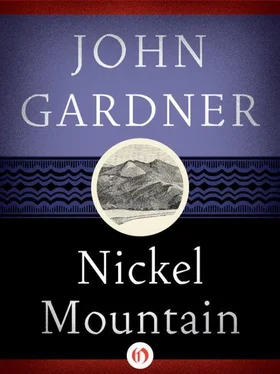He woke up lying on his back on the highway, some kind of blanket thrown over him. The car stood on one corner, wheels up, leaning against the snowbank, one headlight shooting up into the sky, every detail of the car unnaturally sharp under the blinding headlights of the plow. The radio was still playing. All around the car there were bits of glass, glittering like diamonds. In his head there was a steady mumble, like the mumble of the train wheels, and a suggestion of voices. Six feet away from him, in the middle of the road, a man in thick goggles and a cap that hid all but his goggles and chin was bending over a body, looking at papers from a wallet. Willard closed his eyes again, concentrating on the hardness of the ice beneath him, the pleasant cold coming through his clothes, the sharp wet-wool smell of the blanket. He could feel snowflakes landing on his eyebrows and lashes. He couldn’t remember having felt delicate sensations with such force since his early childhood: It was as if his body had grown very large, as large as the night, and calm. He could still hear the murmuring voices. They were more insistent now, carrying intelligible words and phrases, stubbornly assaulting his pleasant calm as if from somewhere outside it. At last, realizing what really he had known for some time — that there were people standing over him — he opened his eyes again. His vision was not as clear this time as it had been before. Dust of snow blew along the road, rising out of the road like fire, obscuring the figures of the two men. There was another car now, bright lights facing the lights of the snowplow, closing him in. The men were troopers. One of them was bending down to him, more like a machine than like a man, no feature showing but the flat impersonal mouth and the courthouse chin. “This one’s waking up,” he said. His voice was metallic, like the voice of Superman on the radio. He said, “Are you hurt?”
“I think I’m all right,” he said. “A little headache.” When he sat up the headache was suddenly ferocious, and his stomach was full of a flat gray pain. He thought of lying down again but decided not to. He leaned on his arms.
“Take your time,” the trooper said.
The body on the road was wrapped in a thick gray cover. He was dead, then. It’s too bad, he thought. She’s going to have a painful delivery. The front wheel’s turned sideways, and there are always the pedals. He stopped himself, frightened.
The trooper said, “You knew him?” His sheepskin glove pointed.
Willard nodded, then shook his head. “He was giving me a lift. He said his name was Taylor.”
“Where’d he pick you up?”
“Utica. I was coming home from school. I came to Utica by train.”
Behind the goggles he was taking it down, maybe to write up later, inside his warm car. “Where were you heading?”
“New Carthage. That’s where my parents live.” He thought of asking how far they’d gotten.
The trooper said, “Can you make it to the car?”
He got up, the trooper helping him, and found that his legs still worked. Inside the car it was so hot he could hardly breathe, or so it seemed at first. The radio was going. The two troopers stood outside the door, talking, and then after a while they carried something past the window and put it in the trunk. They got into the car and the one who was driving lifted the radio receiver. “We’re bringing back the body,” he said. “No point sending them out in this.” Then he nosed the car around between the snowbanks to head back the way he’d come. The snowplow came behind him. Willard closed his eyes and instantly the plow was bearing down on them again, the lights swift and blinding. In the front seat, one of the troopers said something and the other one laughed.
The State Police Post was a converted farmhouse, set back from the road, with sheds like chicken houses behind, for the cars. (Most of this he saw later, after the sun had come up and the storm was over: white drifts stretching away toward the mountains and mounded up on the shed roofs and the branches of trees, so bright you could only glance at it. Icicles hung from the eaves of the shed and beside the window where he stood, the remains of some earlier storm. The world was hushed and beautiful, and also terrible in its emptiness, that morning; but that was later. While it was still dark he saw only the room where they put him to wait.) The room was dim, vaguely like the waiting room of a smalltown dentist’s office at night. A desk, a calendar, a couple of lamps, nothing much more. Over the window on the outside there was a kind of grate — not bars, exactly, more like a heavy-duty cyclone fence. Beyond the closed door he could hear them talking from time to time, now and then a voice on the radio, the click of a typewriter. He lay on the cool green leather couch sometimes dozing, sometimes listening. He went through the conversation with the florist, the storm, the accident again and again, as though his mind could not get free of it. There was a doctor coming to check him, they said. That was strange. He’d have thought they’d have taken him directly to a hospital somewhere, if they thought there might really be anything wrong. But no use thinking. For the moment he was caught in the enormous web of their inscrutable efficiency. Police system hung in the air all around him, neither friendly nor unfriendly, merely systematic: The radio in the next room barked and sputtered from time to time — the whole state on a party line, the sheafs of papers in the shabby gray files available in seconds to a trooper sitting at Niagara. Still he was seeing the snowplow bearing down on them, the body in the road, the troopers’ muffled figures passing the car window, carrying something. One of them came in and asked him if he wanted coffee — his face not unfriendly (weak-chinned, dull-eyed) but as impersonal as the goggled faces on the highway — and after a long time he brought it to him in a thick, cheap restaurant cup. “I lost my billfold,” Willard said. The man looked at him for what seemed two full seconds, and for the first time Willard wondered how he could have lost the billfold from his hip pocket, with his overcoat on over it. He said, “Am I being held for something?” The man said, “I guess they want a doctor to look you over.”
It was hours later (the sky light now and the wind finished) that the doctor came. With him there was a huge, red-headed man with tiny, somewhat slanted eyes, wearing an overcoat. The red-headed man sat down at the desk and smoked a coal-black pipe while the doctor thumped Willard’s chest and pressed his fingers into his abdomen. The two of them left ten minutes later, hardly having said three words, and twenty minutes after that the red-headed man came back. He sat down and heaved one foot up on the desk. “So you’re a student,” he said. When he smiled his eyes and teeth made him look like a fox. He relit the pipe.
Willard nodded.
“You’re lucky to be alive,” the man said.
“I guess that’s right.”
He shook his head, blowing smoke past the pipe bowl, picking up a sheaf of papers. “It must be because of your falling against him. His body was a kind of cushion. It wouldn’t be so surprising if you’d been asleep.”
Willard looked at him, but he was reading, paying no attention. “What do you mean?”
“Surprising you didn’t get killed,” he said. “When you’re asleep your body’s relaxed.” He turned the page. He said then, “Strange neither of you saw it.”
He nodded. “It’s like I told the man who’s here at night,” he began. His blood went cold. He’d told the other one he was asleep when it happened.
The red-headed man was poking at his pipe with an unbent paper clip, scowling into the dark of the bowl as if paying no attention to what Willard was saying. But he said, “The sergeant with the crew cut?” He looked up to catch Willard’s frightened nod. He too nodded, immensely satisfied with himself. “That’s Tom Widdley.” He stuffed the pipe again and got it going, and for a long time he just sat smoking, looking with pleasure at the smoke as it went up.
Читать дальше











